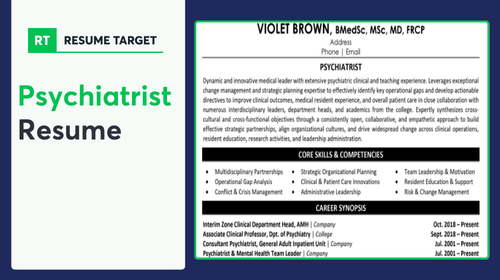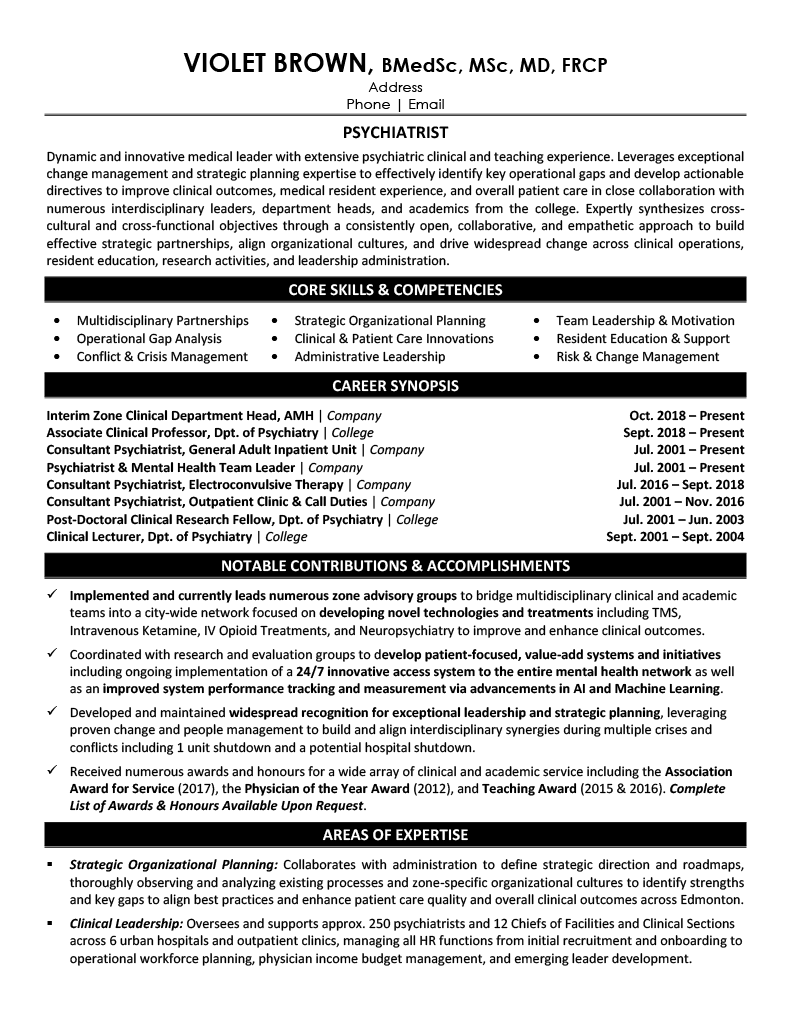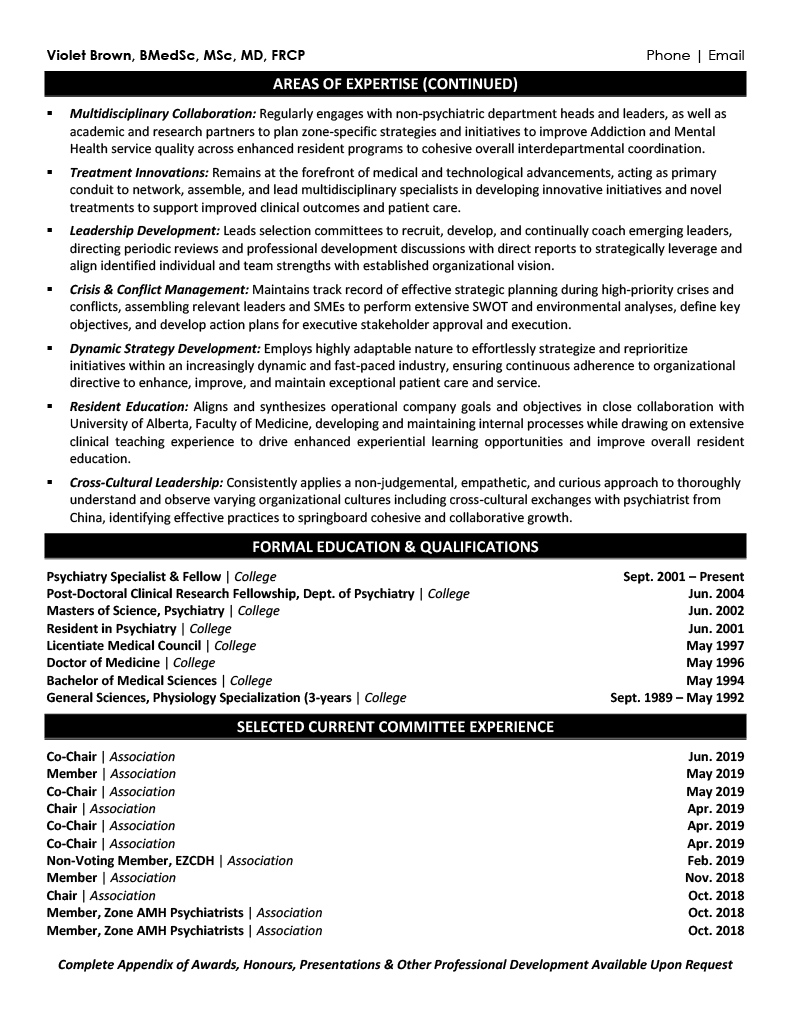

Translating complex patient outcomes into compelling resume achievements can feel like an impossible task. Many psychiatrists struggle to balance clinical expertise with measurable impact in their applications.
Are you finding it challenging to showcase both your therapeutic skills and business results? Your resume needs to demonstrate your ability to improve patient outcomes while highlighting your contributions to mental healthcare delivery.
Resume Target specializes in helping psychiatrists craft powerful career narratives that resonate with employers. We'll help you transform your clinical experience and patient success stories into a resume that lands more interviews.


As mental health physicians, psychiatrists stand at the intersection of neuroscience and emotional wellness, wielding the unique ability to both prescribe medications and provide psychological treatments to help patients reclaim their lives from mental health challenges.
Using their extensive medical training and deep understanding of human behavior, these specialists evaluate patients through comprehensive assessments, develop personalized treatment plans using the DSM-5 diagnostic criteria, and carefully monitor progress through a combination of medication management and therapeutic interventions.
If you're considering a career in psychiatry, you're looking at a dynamic field that combines the precision of medical science with the art of human connection, offering numerous opportunities to specialize in areas like child psychiatry, addiction medicine, or neuropsychiatry as you advance in your career.
Let's talk about what's exciting in the psychiatry field - your earning potential as a psychiatrist can be truly remarkable! From starting your career to reaching executive levels, your compensation grows substantially as you gain experience and potentially specialize in specific areas of mental health care. And guess what? Those who choose to work in physician offices tend to earn even more!
Figures from: U.S. Bureau of Labor Statistics
The journey to becoming a psychiatrist involves extensive education and specialized training, starting with medical school and leading to board certification. From there, you can advance through various specializations and leadership roles in mental healthcare.
Beyond clinical expertise, advancing in psychiatry requires mastering complex decision-making skills and developing strong leadership capabilities.
- Diagnostic Assessment and Treatment Planning - Psychopharmacology Management - Clinical Research and Analysis - Interpersonal Communication and EmpathyThe path to becoming a psychiatrist starts with completing pre-med undergraduate studies, followed by medical school, residency training, and obtaining state licensure to practice psychiatric medicine.
To build your foundation for psychiatric practice, you'll need to develop core competencies including recognizing ethical conflicts and questioning empirical assumptions throughout your medical training journey.
Note: I kept the introduction and transition sentences concise while incorporating the required elements and maintaining a professional yet accessible tone. The introduction outlines the basic pathway while the transition sentence integrates the research data about core competencies in a natural way that speaks directly to the reader.Requirements from American Psychiatric Association
From rural Idaho to bustling Florida, psychiatrists are in high demand across healthcare settings and geographic regions.
Figures from Becker's Behavioral Health
Struggling to translate your years of psychiatric expertise, patient care achievements, and clinical experience into a compelling resume that stands out to medical facilities and private practices? This comprehensive, section-by-section guide will show you exactly how to craft a powerful psychiatrist resume that highlights your clinical skills, therapeutic approaches, and patient outcomes.
As a psychiatrist who spends your days analyzing complex patient cases, condensing your own professional story into a few powerful lines can feel surprisingly challenging.
While you excel at understanding human behavior and providing life-changing mental health care, translating your clinical expertise, research contributions, and patient outcomes into a compelling career snapshot requires a different kind of diagnostic skill - one that helps hiring managers quickly recognize your unique value.
How would you describe your therapeutic approach and psychiatric philosophy in a way that distinguishes you from other mental health professionals?
Reason: Your therapeutic approach defines how you interact with patients and solve complex mental health challenges. This helps employers understand your professional identity and whether you'll align with their practice culture.
What combination of psychiatric specialties and patient populations have shaped your expertise as a mental health physician?
Reason: This helps frame your broad clinical experience while highlighting your versatility across different psychiatric contexts, showing potential employers the full scope of your professional capabilities.
How do you balance the medical and psychological aspects of psychiatric care in your practice to deliver comprehensive patient outcomes?
Reason: This demonstrates your holistic understanding of psychiatric medicine and showcases your ability to integrate both pharmacological and therapeutic interventions effectively.
As a psychiatrist, you need to showcase both your clinical expertise and interpersonal abilities, making your skills section particularly nuanced and multifaceted.
Your resume should reflect your diagnostic capabilities, therapeutic approaches, and medication management experience, while also highlighting essential soft skills like empathy, communication, and crisis intervention.
Showcase your clinical expertise by organizing your professional history into three powerful segments: a concise role overview highlighting your practice settings, measurable patient care achievements, and core responsibilities that demonstrate your therapeutic and diagnostic capabilities.
Many psychiatrists struggle to effectively communicate their clinical expertise and patient outcomes without compromising confidentiality or appearing boastful. Transform your complex patient care successes into measurable achievements that showcase improved patient outcomes, reduced readmission rates, and innovative treatment protocols that advance mental healthcare delivery.
The responsibilities section demonstrates how Psychiatrists combine medical expertise with therapeutic skills to treat mental health conditions. This section should translate complex psychiatric work into clear achievements that showcase your impact on patient care and clinical outcomes.
Your psychiatric credentials and board certifications are the foundation of your medical career, so list them prominently starting with your most advanced qualifications. Make sure to highlight your medical degree, residency training, and any subspecialty fellowships, along with your current board certification status and state medical licenses.
Now that you've created a strong foundation using Resume Target's comprehensive resume writing guidelines, you're ready to transform your CV into a powerful tool for landing your ideal psychiatry position.
While many medical professionals rely solely on standardized CVs, successful psychiatrists know that personalizing their resume for each position creates a compelling narrative that showcases their unique therapeutic approach and specialized expertise.
By strategically incorporating keywords and requirements from specific job descriptions, your customized psychiatrist resume will not only clear ATS screening systems but will also demonstrate to hiring managers how your clinical experience, therapeutic methods, and patient care philosophy align perfectly with their practice needs.
Ready to stand out in a competitive field? Let's transform your psychiatrist resume into a targeted presentation that proves you're the mental health expert they've been searching for!
Don't let limited clinical experience hold you back from pursuing your dream career as a Psychiatrist! Your medical school education, residency training, and specialized psychiatric rotations provide the perfect foundation for showcasing your qualifications.
Focus on highlighting your clinical rotations, research experience, and any specialized mental health training you've received during your education.
For a comprehensive approach to structuring your medical credentials, check out our Student Resume Writing Guide to ensure you're presenting your qualifications in the most impactful way.
Your psychiatry resume summary is your chance to showcase your medical education, clinical rotations, and specialized training that make you an exceptional candidate for residency programs.
Focus on highlighting your patient care philosophy, research contributions, and specific areas of psychiatric interest to stand out from other medical graduates.
"Compassionate and detail-oriented medical graduate with comprehensive training in psychiatric evaluation and treatment through clinical rotations at leading mental health facilities. Demonstrated expertise in conducting patient assessments, developing treatment plans, and collaborating with multidisciplinary healthcare teams during 2,000+ hours of clinical experience. Published research on adolescent anxiety disorders and actively participated in cognitive behavioral therapy workshops. Seeking psychiatry residency position to further specialized training while providing empathetic, evidence-based mental healthcare."
Now's your chance to showcase the rigorous medical training and specialized psychiatric expertise that makes you uniquely qualified to help patients!
Don't just list your degrees - highlight key clinical rotations, research projects, and specialized certifications that demonstrate your expertise in areas like psychopharmacology, cognitive behavioral therapy, or addiction medicine.
The Johns Hopkins Psychiatry residency program offers a comprehensive curriculum that includes foundational courses in Internal Medicine and Neurology, alongside advanced psychiatric training.Relevant Coursework: Internal Medicine | Clinical Neurology | Psychopharmacology | Behavioral Sciences | Psychiatric Assessment | Clinical Psychotherapy
Key Projects:
Mental Health Intervention Study: Conducted a comprehensive research project examining the effectiveness of combined pharmacological and therapeutic approaches in treating major depressive disorder in young adults, resulting in development of an integrated treatment protocol.
Psychiatric Emergency Response Protocol: Collaborated with a multidisciplinary team to design and implement an improved emergency psychiatric assessment framework for acute care settings.
Leverage your medical school training, clinical rotations, and residency experiences to showcase the comprehensive blend of clinical expertise and interpersonal abilities that make you an effective entry-level psychiatrist.
As a newly qualified psychiatrist, your combination of medical knowledge and therapeutic skills positions you well for a rewarding career in mental health care, where demand for qualified professionals continues to grow significantly.
When you've dedicated your career to understanding the human mind and helping others heal, it can feel overwhelming to turn that complex journey into a clear, compelling career story that resonates with hiring managers.
At Resume Target, we specialize in crafting powerful medical resumes that showcase both your clinical expertise and your human touch - we've helped countless psychiatrists transform their careers by highlighting their unique blend of diagnostic excellence and patient care.
Our deep understanding of the psychiatric field means we know exactly how to position your experience with different treatment modalities, research contributions, and patient outcomes in ways that matter to employers.
With mental health needs at an all-time high and healthcare facilities actively recruiting, now is the perfect time to ensure your resume opens the right doors - schedule your free consultation with our medical resume experts today.
Impress any hiring manager with our Medical resume writing service. We work with all career levels and types of Medical professionals.
Learn More → Medical Resume Writing Services